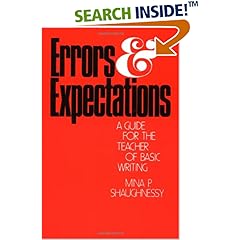In the first chapter of Mina P. Shaughnessy's Errors & Expectations, she discusses her time pioneering the SEEKS program during the early years of open admissions at the City University of New York in 1970. However, the things she said kept reminding me of my own experiences as a beginning teacher of writing in a small* rural high school in the Midwest. When I began teaching in 2002, I was the high school English Department. I taught six different classes, including a college preparatory course that was to focus heavily on composition. Our superintendent was new as well and at the end of my first full week of teaching, his secretary came around and collected my curriculum guide for “revision.” It never came back. So there I was working alone and without a framework. If that wasn’t bad enough my students were little better than those Shaughnessy describes. I, too, after the first week thought to myself: "Nothing...short of a miracle [is] going to turn such students into writers...everyone [is] probably going to fail" (3). And the truth is that many of them did fail and a lot of it was owing to my attitude about basic writing. It pangs my conscious considerably to know that there were students in that first year who I could have approached with compassion and patience, who I instead alienated by defacing their papers with bright red academic graffiti. I had always had a natural talent for stringing words together on paper, so I didn't understand to what degree "the BW student both resents and resists his vulnerability as a writer" (7). The idea of leaving a trail of error never really occurred to me then—but how I would have hated the idea! In fact, I think sometimes I thought of unmarked errors in their writing as mistakes I didn’t catch. So what did I do? I marked them all. I was the Mussolini of English grammar. My overzealous proofreading took hours and hours. It sickens me to think that I could have put all that effort toward actually teaching them how to write if only I’d had a little guidance. My intentions were good, but in so many ways I was too insecure and too inexperienced to focus on the big picture. My classes may have been filled with students at the basic level as writers, but I was at the basic level as a writing teacher. It was a difficult time, but my students and I learned and grew together, though perhaps not as efficiently as we could have with a little more guidance.
*I know some people say "small" and they mean “just a few hundred students,” but I'm talking about graduating classes generally in the teens. Small and rural tends to imply so much, but I'm going to have to leave the rest to your imagination as I don't think further description of the students or the district would be prudent at this time.

Shaughnessy, Mina P. Errors & Expectations. Oxford University Press: New York, 1977.

"[Grammar] is a religion."**
-Benito Mussolini
**It may be of interest to some historical scholars that the original quote actually reads "Fascism is a religion." However, that sort of spoils the joke, doesn't it? FYI, the photo of Mussolini was taken right after he finished his first reading of Strunk's Elements of Style. Look how smug and self-satisfied he is with all that grammatical Knowledge! I'll bet he's just dying to omit some needless words.